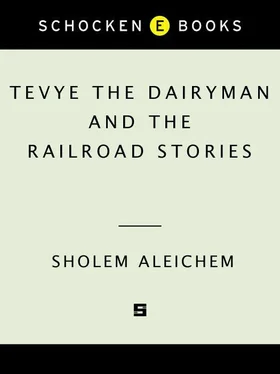There was a bustle of passengers in the car and my Jew all but ran to the conductor.
“Kodny?”
“Kodny.”
“Well, be well, and have a good trip, and don’t tell a soul who I’m with. I don’t want anyone in Kodny to know that I’ve got a professor. They’ll all come running if they do!”
And with those last, confidential words to me, he was gone.
A few minutes later, though, while the train was still at a standstill, I caught a glimpse through the window of a rickety buggy and a pair of careworn, ragged gray horses. In the buggy sat a little old man with a gray beard and youthful red cheeks. Across from him, half in and half out of the vehicle, as though hanging from it by a thread, sat my strange Jew. He was rocking back and forth, his face beaming, his eyes glued so hard to the professor that they were all but popping from their sockets.
It’s a pity I’m not a photographer and don’t travel with a camera. It would have been a great thing to have taken that Jew’s picture. Let the world see what a happy man looks like — the happiest man in all Kodny.
(1909)
This time there were no more than a few dozen of us Jews, and we sat in the third-class car in comparative comfort. That is, whoever had found a seat had one; the other passengers stood leaning against the walls of the compartments and joined in the conversation from there. And what lively conversation it was! As usual, everyone was talking at once. It was early in the day. We had all had a good night’s sleep, said our morning prayers, grabbed a bite more or less to eat, and even managed to light up a few cigarettes, and we were all in the mood to talk — very much so, in fact. About what? About anything and everything. Everyone tried to think of some fresh, juicy item that would make all the others sit up and listen, but no one was able to hold the stage for long. The subject changed every minute. No sooner did it light on the recent harvest — that is, the wheat and oats crop — than it shifted, don’t ask me why, to the war with Japan, while after barely five minutes of fighting the Japanese, we moved on to the Revolution of 1905. From the Revolution we passed to the Constitution, and from the Constitution it was but a short step to the pogroms, the massacres of Jews, the new anti-Semitic legislation, the expulsion from the villages, the mass flight to America, and all the other trials and tribulations that you hear about these fine days: bankruptcies, expropriations, military emergencies, executions, starvation, cholera, Purishkevich, Azef …
“A-z-ef!”
The name of that secret police spy who had informed on so many revolutionaries only needed to be mentioned for the whole car to be thrown into a turmoil: Azef, and more Azef, and still more Azef, and Azef once again.
“Mind you, you’ll excuse me for saying so, but you’re all a lot of cattle, you are! What’s so special about Ashev? What bunkum! The whole world’s up in arms about him, but who the Devil is he? A young punk, a no-good bum, a nobody, a stool pigeon, a nothing, a big fat zero! If you’d like, I can tell you a story about a stool pigeon, and a hometown boy from Kaminka at that, who makes Ashev look pale by comparison!”
These words were uttered by one of the standees who loomed over us from his place against a wall. I glanced up to have a look at him and saw a generously proportioned individual with a good silk cap on his head, twinkling eyes, a rosy, freckled face, and no front teeth. That is, his two front incisors were missing, which was apparently why he whistled when he spoke, so that “Azef” came out sounding like “Ashev.”
I took a liking to the fellow right away. I liked the broad girth of him, the way he talked, even the names he called us. In fact, I like such Jews so much that I’m actually jealous of them.
Having been unexpectedly branded as cattle by the Jew from Kaminka, the whole car was as dumbfounded for a moment as if a bucket of cold water had been poured over everyone’s head. It didn’t take long, however, for the passengers to recover, exchange a few glances, and say to the Kaminka Jew:
“You want to be asked to tell us a story? All right, we’re asking! Tell us what happened in Kaminka, we’re curious. Only, what are you standing for? Why don’t you have a seat? There aren’t any, you say? Jews! Shove over a bit! Make room, please.”
Whereupon all of us, though we were already squeezed tightly together, squeezed together even more to make room for the Kaminka Jew. He sat himself broadly down, spreading out his knees like a godfather at a circumcision when the baby is placed in his lap, pushed back the cap on his head, rolled up his sleeves, and commenced in his broad manner of speaking:
“Listen well, my dear friends, because what I’m about to tell you, I want you to know, is not some opera or fairy tale. It’s a true story, mind you, that took place right in Kaminka. My own father, God rest him, told it to me himself, and he heard it more than once from his father. I’ve heard it said that the whole thing was even written down in an old chronicle that was burned long ago. You can laugh all you like, but I tell you it’s a crime it was, because it had some fine stories in it — a sight better than what’s printed in your magazines and storybooks these days.
“In a nutshell, it happened in the reign of Nikolai the First, back in the days of the gauntlet. But what are you smiling at? Do you know what the gauntlet meant? The gauntlet meant getting flogged while you ran it. You still don’t know what it was? In that case, I’d better spell it out for you. Just imagine, then: two rows of soldiers with iron maces stand facing each other, and you go for a little stroll between them some twenty times or more, and in your birthday suit, mind you, while they do what the rabbi did in the schoolroom when you weren’t paying attention to your lessons … Do you know what running the gauntlet is now? Then we’re ready to begin.
“Once upon a time it so happened that the governor — Vassilchikov it was, I believe — ordered a Jew named Kivke to run the gauntlet. Exactly who this Kivke was, or what he had done, are details I can’t tell you. Some say he was no great shakes, just a tavern keeper, and an old sourpuss of a bachelor at that. One Sunday, though, when he was chatting with some Russians in his tavern, God put it into his head to argue religion with them: your God, our God … until one thing led to another and the village elder and the constable were brought and charges of blasphemy drawn up. All he had to do, that barman, was give them a barrel of vodka and the whole thing would have been forgotten. But on top of everything else, he was stubborn: no, he says, Kivke takes nothing back! What must he have thought? He must have thought he’d be slapped with a three-ruble fine and business would go on as usual. Who could have guessed that he’d be made to run the gauntlet because of a few foolish words? In short, they took the old boy and threw him into the cooler until an honor guard could give him twenty-five good whacks of the mace, as God in His wisdom had decreed.
“Well, I hardly need to tell you what went on in Kaminka once the story got out. And when did the bad news break? At night — and not only at night, but on a Friday night too. The next morning, when everyone came to the synagogue for Sabbath services, the place was in an uproar. ‘Kivke’s in the clink!’ … ‘He’s been given the gauntlet!’ … ‘The gauntlet? How come? What for?’ … ‘For nothing. For a few words’ … ‘He’s been framed!’ … ‘What kind of framed? He’s a Jew with a mouth that’s too big for him!’ … ‘It can be eighteen sizes too big, but the gauntlet? How can they do that to him?’… ‘Since when do Jews run the gauntlet? And a local Kaminka Jew yet!’ …
Читать дальше












